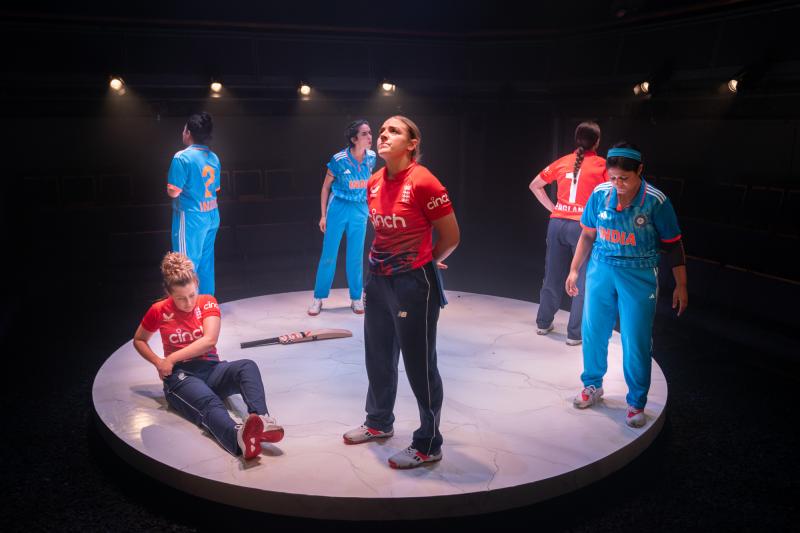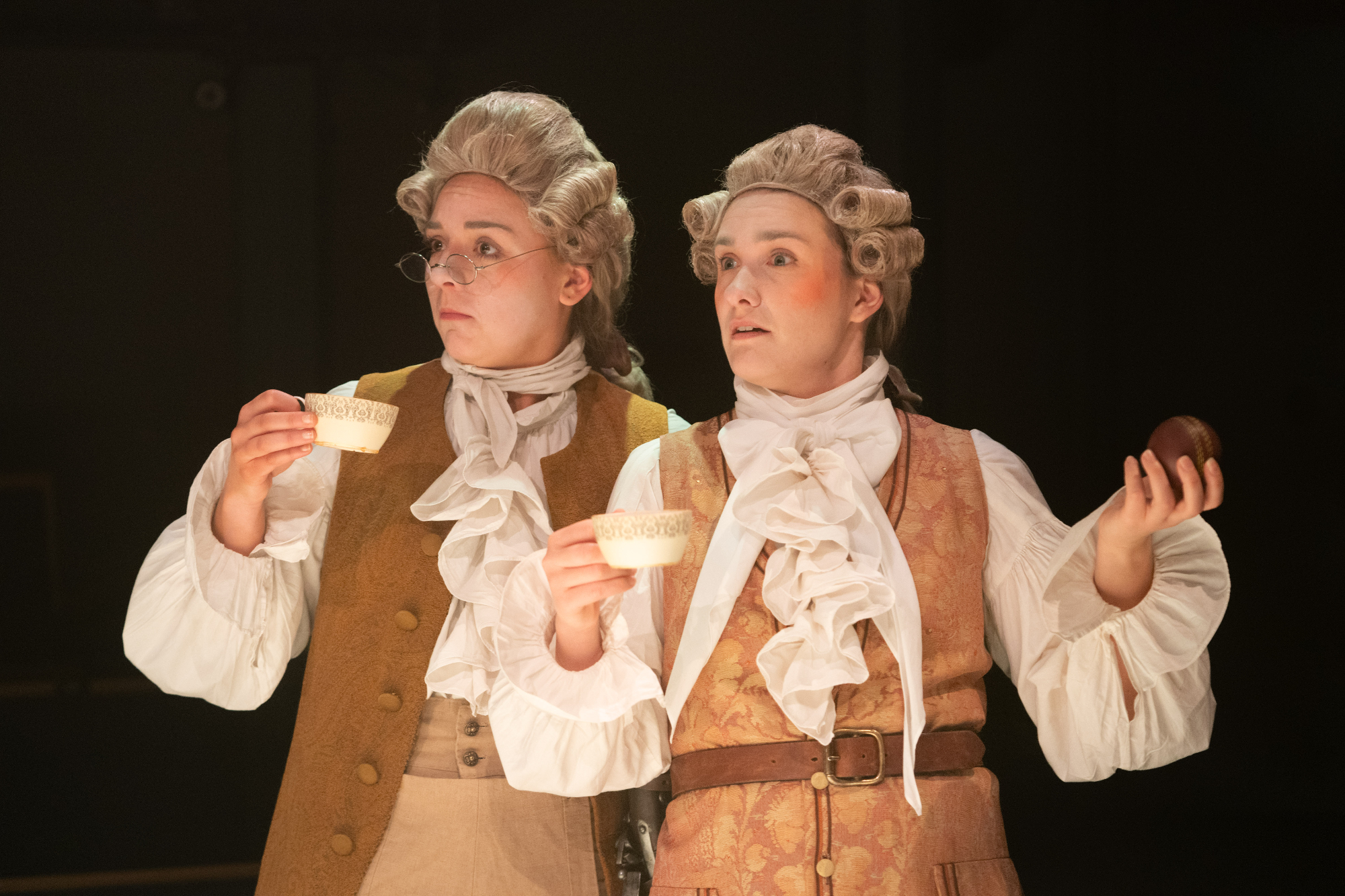Testmatch, Orange Tree Theatre review - Raj rage, old and new, flares in cricket dramedy | reviews, news & interviews
Testmatch, Orange Tree Theatre review - Raj rage, old and new, flares in cricket dramedy
Testmatch, Orange Tree Theatre review - Raj rage, old and new, flares in cricket dramedy
Winning performances cannot overcome a scattergun approach to a ragbag of issues

Cricket has always been a lens through which to examine the legacy of the British Empire. In the 1930s, the infamous Bodyline series saw the new nation, Australia, stand up to its big brother’s bullying tactics. In the 1970s, the all-conquering West Indies team gave pride to the Windrush generation when they vanquished an England whose captain had promised to make them grovel.
Kate Attwell’s 2019 play, Testmatch (receiving its UK premiere) has much to say about Empire but also about an even longer standing power structure - patriarchy. Whether that additional ambition results in a catch on the boundary when essaying a four all along the ground was a better option, will depend on whether you prefer an innings full of six-hitting pyrotechnics or one of safer accumulation. Cricket, like theatre, admits both approaches.
 We open in a situation familiar to anyone who has played or watched the game: a rain delay. Three England players and three India players jib and jibe about their teams’ chances in the vital World Cup match, but soon the bickering turns to matters beyond the drizzle of Lord’s.
We open in a situation familiar to anyone who has played or watched the game: a rain delay. Three England players and three India players jib and jibe about their teams’ chances in the vital World Cup match, but soon the bickering turns to matters beyond the drizzle of Lord’s.
A key theme soon emerges - how history cannot be reduced to a single narrative but is more a collection of competing interpretations with some promoted by powerful bodies and others conveniently buried, and so the prevailing hegemony goes unchallenged. The Indians, with that emerging confidence born of industrial success, see the Raj as oppressive and exploitative and that such attitudes live on today; the English cling to their story of benign paternalism, the old tropes of building the railways and the ending of suttee never far from their thoughts.
Plenty to go at there, enough to deal with the most persistent of St John’s Wood downpours, but a we’re given plenty more to field in the outer. Racism, sexism, corruption and LGBT+ issues are stirred into an already bubbling tandoor and the play buckles under the weight of so many hot button topics.
Cricket fans will recognise allusions to the anger issues of the young Ben Stokes, the current England Men’s Test captain and now empathy machine; they’ll see a reference to Ellyse Perry, the Australian double-international and they’ll catch more than a whiff of the Hansie Cronje spot-fixing scandal, now 24 years in the past.
Whether those names are familiar or not, the speed with which these issues arise and their inevitably swift and shallow examination will feel unsatisfactory, too much packed into too small a dramatic space. It also reduces the players to mouthpieces rather than fully rounded individuals, more vehicles to introduce points of view than living, breathing characters.
The ensemble cast win us over by investing each of the players with enough charm and vulnerability for us to understand why they behave as they do. Aiyana Bartlett, Aarushi Ganju, Mia Turner, Tanya Katyal, Bea Svistunenko and Haylie Jones (both pictured above) convince as competitive adversaries who, like so many sports stars, have not yet acquired the emotional intelligence to deal with the pressures their athletic prowess has delivered. They are, it has to be said, very loud in The Orange Tree’s intimate space, which diminishes rather than emphasises the tension, especially as we can’t always see their faces, the play set in the round.
Director, Diane Page, is less sure-footed after the interval, when, with six costume changes (I was sad to see Cat Fuller’s beautifully observed detail of grass-staining on the cricket shoes go) we’re taken back to 1770. The famous (or should that be infamous?) East India Company controls Bengal and is extracting as much as they can from its resources for the benefit of the British Raj, the First War of Independence / Indian Mutiny still 87 years in the future.
The comedy is too broad, the English administrators caricatures of Gilbert and Sullivan’s satirical creations, sometimes verging on pantomime and the Indians are given too much clunky exposition to deliver. There’s also too much time spent on one of cricket’s many apocryphal stories (that overarm bowling was invented by women hampered by their crinolines) and not enough on the famine that rages through the land and the extraordinary arrangements through which the Company brokered its rule.
For all its flaws, the play generates its fair share of laughs and it does provoke much-needed thoughts about why the soi-disant culture wars of today matter, control of the past being the key to control of the present. But it sends too many balls into the air which are subsequently dropped to be in contention to lift the trophy when the rain abates.
rating
Explore topics
Share this article
The future of Arts Journalism
You can stop theartsdesk.com closing!
We urgently need financing to survive. Our fundraising drive has thus far raised £49,000 but we need to reach £100,000 or we will be forced to close. Please contribute here: https://gofund.me/c3f6033d
And if you can forward this information to anyone who might assist, we’d be grateful.

Subscribe to theartsdesk.com
Thank you for continuing to read our work on theartsdesk.com. For unlimited access to every article in its entirety, including our archive of more than 15,000 pieces, we're asking for £5 per month or £40 per year. We feel it's a very good deal, and hope you do too.
To take a subscription now simply click here.
And if you're looking for that extra gift for a friend or family member, why not treat them to a theartsdesk.com gift subscription?
more Theatre
 Hedda, Orange Tree Theatre review - a monument reimagined, perhaps even improved
Scandinavian masterpiece transplanted into a London reeling from the ravages of war
Hedda, Orange Tree Theatre review - a monument reimagined, perhaps even improved
Scandinavian masterpiece transplanted into a London reeling from the ravages of war
 The Assembled Parties, Hampstead review - a rarity, a well-made play delivered straight
Witty but poignant tribute to the strength of family ties as all around disintegrates
The Assembled Parties, Hampstead review - a rarity, a well-made play delivered straight
Witty but poignant tribute to the strength of family ties as all around disintegrates
 Mary Page Marlowe, Old Vic review - a starry portrait of a splintered life
Tracy Letts's Off Broadway play makes a shimmeringly powerful London debut
Mary Page Marlowe, Old Vic review - a starry portrait of a splintered life
Tracy Letts's Off Broadway play makes a shimmeringly powerful London debut
 Little Brother, Soho Theatre review - light, bright but emotionally true
This Verity Bargate Award-winning dramedy is entertaining as well as thought provoking
Little Brother, Soho Theatre review - light, bright but emotionally true
This Verity Bargate Award-winning dramedy is entertaining as well as thought provoking
 The Unbelievers, Royal Court Theatre - grimly compelling, powerfully performed
Nick Payne's new play is amongst his best
The Unbelievers, Royal Court Theatre - grimly compelling, powerfully performed
Nick Payne's new play is amongst his best
 The Maids, Donmar Warehouse review - vibrant cast lost in a spectacular-looking fever dream
Kip Williams revises Genet, with little gained in the update except eye-popping visuals
The Maids, Donmar Warehouse review - vibrant cast lost in a spectacular-looking fever dream
Kip Williams revises Genet, with little gained in the update except eye-popping visuals
 Ragdoll, Jermyn Street Theatre review - compelling and emotionally truthful
Katherine Moar returns with a Patty Hearst-inspired follow up to her debut hit 'Farm Hall'
Ragdoll, Jermyn Street Theatre review - compelling and emotionally truthful
Katherine Moar returns with a Patty Hearst-inspired follow up to her debut hit 'Farm Hall'
 Troilus and Cressida, Globe Theatre review - a 'problem play' with added problems
Raucous and carnivalesque, but also ugly and incomprehensible
Troilus and Cressida, Globe Theatre review - a 'problem play' with added problems
Raucous and carnivalesque, but also ugly and incomprehensible
 Clarkston, Trafalgar Theatre review - two lads on a road to nowhere
Netflix star, Joe Locke, is the selling point of a production that needs one
Clarkston, Trafalgar Theatre review - two lads on a road to nowhere
Netflix star, Joe Locke, is the selling point of a production that needs one
 Ghost Stories, Peacock Theatre review - spirited staging but short on scares
Impressive spectacle saves an ageing show in an unsuitable venue
Ghost Stories, Peacock Theatre review - spirited staging but short on scares
Impressive spectacle saves an ageing show in an unsuitable venue
 Hamlet, National Theatre review - turning tragedy to comedy is no joke
Hiran Abeyeskera’s childlike prince falls flat in a mixed production
Hamlet, National Theatre review - turning tragedy to comedy is no joke
Hiran Abeyeskera’s childlike prince falls flat in a mixed production
 Rohtko, Barbican review - postmodern meditation on fake and authentic art is less than the sum of its parts
Łukasz Twarkowski's production dazzles without illuminating
Rohtko, Barbican review - postmodern meditation on fake and authentic art is less than the sum of its parts
Łukasz Twarkowski's production dazzles without illuminating

Add comment